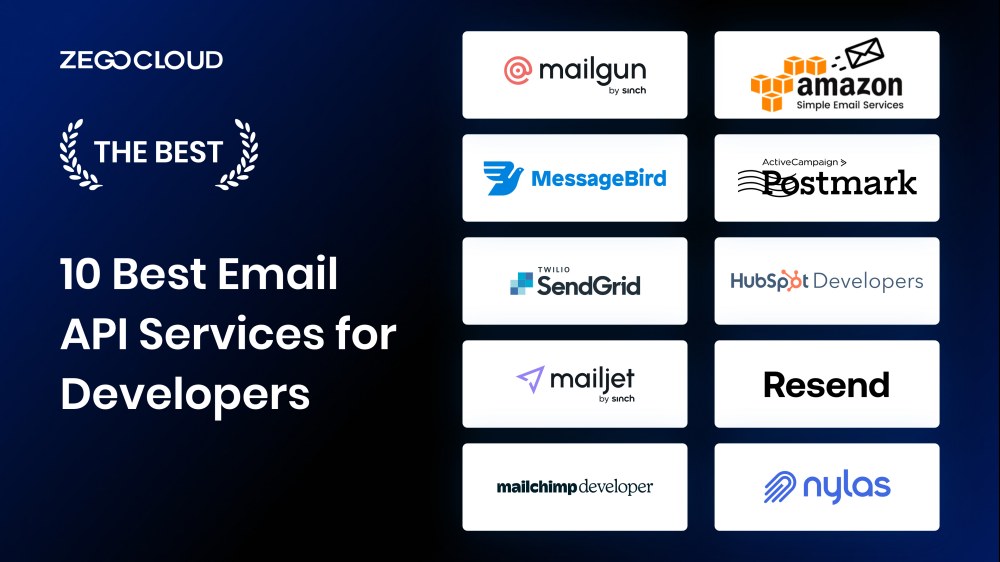An Email API, or Application Programming Interface, is a powerful tool that seamlessly integrates email functionality into your applications or websites. This guide will explore how Email APIs work, their key features, and the benefits they offer in enhancing communication and streamlining operations.
What is an Email API?
An email API (Application Programming Interface) allows developers to integrate email functionalities into their applications or websites, enabling them to send, receive, and manage emails directly through the application’s interface.
This tool connects the application to an external email service provider’s system, leveraging its infrastructure to handle tasks such as sending transactional and marketing emails, managing subscriber lists, and analyzing the effectiveness of email campaigns. By using an email API, developers can ensure efficient and scalable email communication while focusing on their application’s primary functions.
Why Do You Need an Email API?
Using an email API can significantly enhance the functionality and efficiency of an application or business process by automating and integrating email communications directly within systems. Here are the key reasons why you might need an email API:
- Automation: Email APIs automate the process of sending emails, which is particularly useful for transactional emails like order confirmations, shipping notifications, and password resets. This automation ensures timely and consistent communication with users or customers without manual intervention.
- Scalability: As your user base grows, the demand for sending and managing emails increases. An email API can handle large volumes of emails effortlessly, allowing your application to scale without the need for additional resources to manage email systems.
- Reliability: Email APIs are built on the infrastructure of experienced email service providers, ensuring high deliverability rates and compliance with email regulations (like SPF, DKIM, and DMARC). This helps in reducing the risk of your emails landing in the spam folder.
- Personalization and Customization: They allow for detailed customization of email content, format, and scheduling, enabling personalized communication tailored to the recipient’s behavior, preferences, and previous interactions.
- Analytics and Tracking: Email APIs often come with built-in analytics to track the performance of your emails, providing insights into open rates, click rates, bounce rates, and more. This data is invaluable for refining your email strategies and improving engagement.
- Cost-Effectiveness: Integrating an email API eliminates the need for separate email servers and the associated maintenance, reducing overall costs while benefiting from the expertise of specialized email service providers.
Types of Email APIs
Email APIs can be categorized based on the functionalities they offer and the types of emails they are designed to handle. Here are some common types of email APIs that developers and businesses might utilize:
Transactional Email APIs:
These are used for sending automatic, event-triggered emails such as account confirmations, password resets, purchase receipts, and other notifications that are specific to a user’s actions. They focus on high deliverability and speed.
Marketing Email APIs:
Tailored for bulk email campaigns and promotional emails, these APIs help in managing large-scale email operations like newsletters, promotional offers, and customer engagement campaigns. They often include features for list management, campaign segmentation, and detailed analytics.
SMTP (Simple Mail Transfer Protocol) APIs:
These APIs provide a way to send emails using the SMTP protocol, which is the standard protocol for sending emails across the internet. SMTP APIs are versatile, allowing for both transactional and marketing emails but require more management regarding deliverability and compliance.
RESTful Email APIs:
Built on REST architecture, these APIs are designed to be easy to integrate and use in modern web applications. They support tasks like sending emails, managing templates, and retrieving sending logs through standard HTTP methods.
Email Parsing APIs:
These APIs are designed to interpret and extract data from incoming emails. They can be used to automate workflows, such as updating databases, creating support tickets, or triggering specific actions based on the email content.
Email Verification APIs:
These tools ensure that the email addresses collected are valid and deliverable, which is crucial for maintaining email deliverability rates and reducing bounce rates. They check email syntax, domain validity, and whether the email address exists on the server.
How Does an Email API Work?
An Email API acts as a bridge between applications and email servers, enabling automated email functionalities. When integrated into an application, it uses specific protocols to send requests, like sending or receiving emails, to the email server. These requests are written in common programming languages and formatted as per the API’s standards.
Upon receiving a request, the Email API translates it into a language understandable by the email server. The server then executes the action, such as dispatching emails or retrieving messages. After completion, the server sends a response back to the API, which translates and relays it to the original application.
This process allows for seamless, automated email operations within applications, greatly enhancing efficiency and scalability in managing email communications. Email APIs are thus essential in modern digital communication, offering both flexibility and reliability.
Top Picks of 10 Best Email APIs
We will start discussing the 10 best email APIs in this section to help you choose the one that suits your business needs. Furthermore, we will also look at their pricing plans and learn about the affordable options among these. Let’s start discussing these email marketing APIs one by one.
1. Mailgun
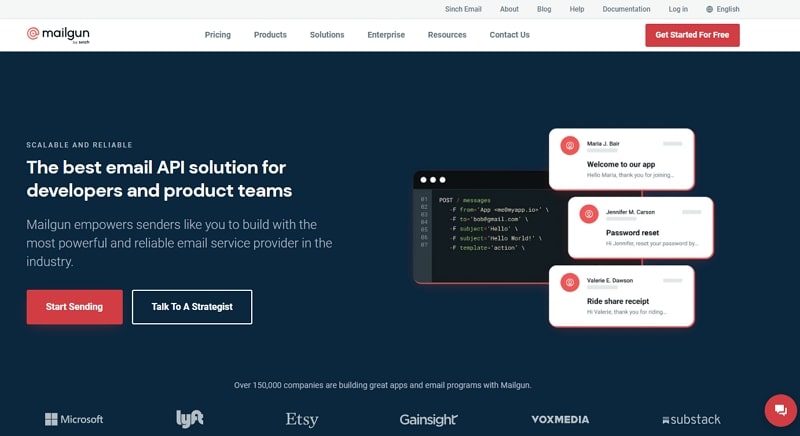
Imagine if adding emails to your apps was an easy task. Mailgun’s APIs make it happen by connecting emails to your apps smoothly. Its developers are very good at keeping their servers running almost always. Mailgun is like a stronghold for email API service, certified for essential things like privacy and security. It’s like having a fully legal service that complies with laws like GDPR and HIPAA.
So, if you are a developer, Mailgun lets you know all the minor details about what happens to your emails, like if they get sent or if people open them. This service is good at ensuring your emails reach their destination, as API helps you track how your emails are doing, which is useful.
Pricing Plans
- Trial: $0/month (5000 emails/month included)
- Foundation: $35/month (50,000 emails/month included)
- Scale: $90/month (100,000 emails/month included)
2. Amazon SES
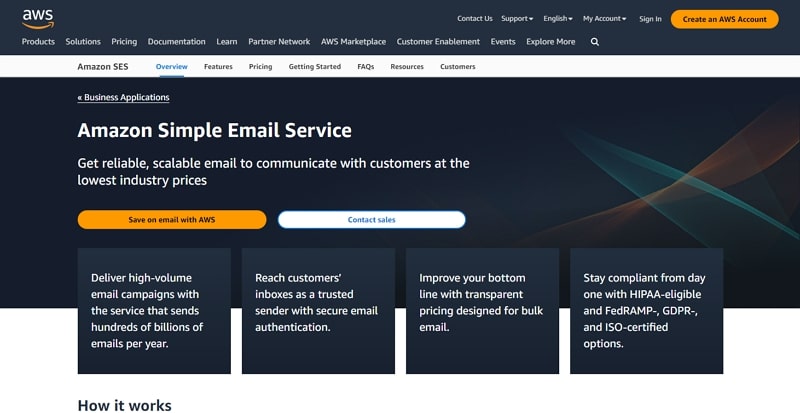
Amazon SES is like a cloud that helps you send lots of emails. It’s useful if you want to tell a lot of people something, like if you have a big sale or you’re sending out a newsletter. Moreover, Amazon SES is an email marketing API that fits into any app, making it great to use. It can also give you reports about your emails, like how many people got them.
If you have a business, Amazon SES can help you stay in touch with your customers. If you want to tell people about new things you have, like products or services, Amazon SES can help you do that. It can also send automatic messages, like when someone buys something from your online shop.
Pricing Plans
- Contact the Sales Team
3. SparkPost (MessageBird)
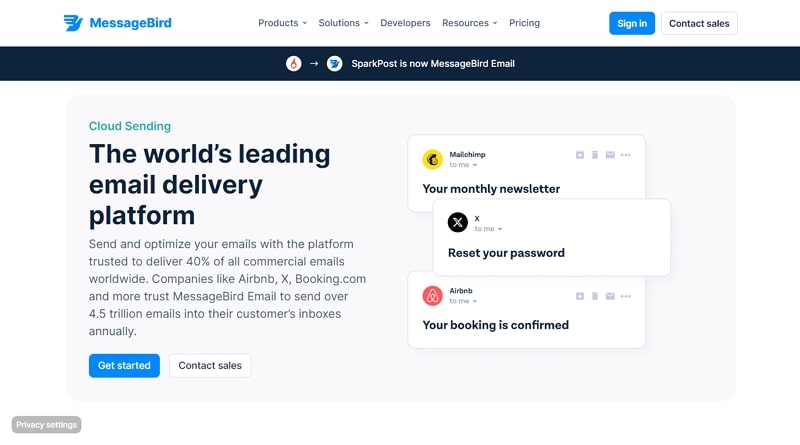
SparkPost is an email API service that sends a huge number of emails, around 4-5 trillion each year, about 40% of all business emails. Moreover, SparkPost mainly helps big companies by sending a lot of emails to them. It also makes sure the emails are safe and according to the defined rules.
However, if you send only a few emails, SparkPost might not be suitable for you. This email marketing API has many features, like sending emails, checking if emails are correct, and seeing how many people read them. You can use these features using their special computer language called an API.
Pricing Plans
- Contact the Sales Team
4. Postmark
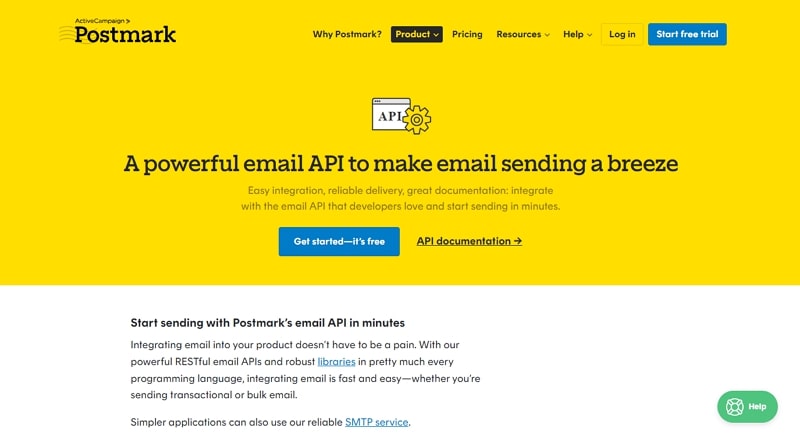
Postmark is a service that assists apps to send emails in a better way. It’s more reliable and easier than the usual way of sending emails. Using this service to send email API also helps you to keep track of how many emails were sent, opened, or had problems. Some notable things about Postmark are that you can sort emails into different types, like one-on-one and big emails for many people.
However, you must prove that your email is real before using Postmark. Moreover, your emails should be of the required file size, or otherwise, you won’t be able to send them. Postmark email API only accepts certain types of attached files, like pictures, and also, you can only send an email to up to 50 people at a time.
Pricing Plans
- Customized Plans Starting from $15/month (Includes 10,000 emails/month)
5. SendGrid
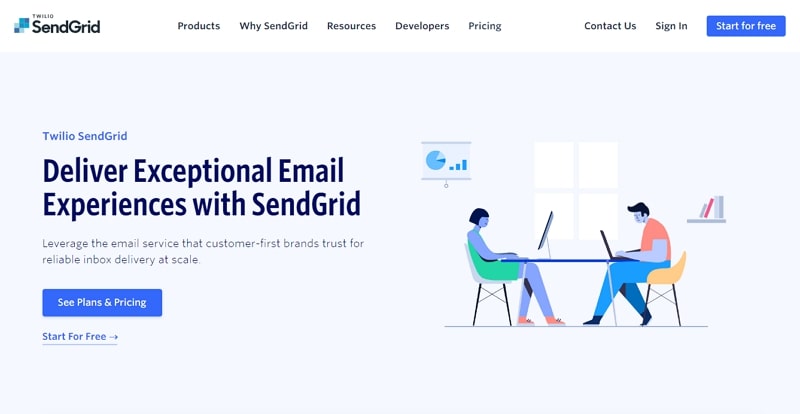
SendGrid has been around since 2009, helping apps add email API features. It’s now part of a bigger group called Twilio, so these APIs do more than just send emails. Moreover, these APIs also help you with text messages and other things. Many people like SendGrid because it offers many features in one place, as you can use it for emails and even for sending messages to phones.
Although, some say that since Twilio took over SendGrid, customer service has not been as good. Also, some people using SendGrid say that not all emails go through or deliver as per requirements.
Pricing Plans
- Trial: $0/month (100 emails/day included)
- Essentials 50K: $19.95/month (50,000 emails/month included)
- Essentials 100K: $34.95/month (100,000 emails/month included)
- Pro 100K: $89.95/month (100,000 emails/month included)
- Pro 300K: $249/month (300,000 emails/month included)
- Pro 700K: $449/month (700,000 emails/month included)
- Pro 1.5M: $749/month (1,500,000 emails/month included)
6. HubSpot
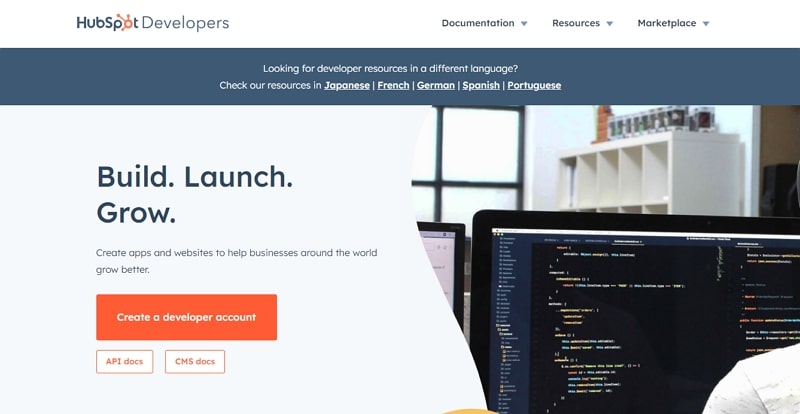
HubSpot Marketing’s free email API makes sending personalized emails to potential customers easier. When someone fills out your form, you can quickly send them a special email without waiting for help from designers or IT. With this, managing leads has become simpler. As soon as a lead submits a form, their additional contact information from the internet is automatically added to your HubSpot CRM.
These also include the details like their job title and social profiles. You can even track their actions and see their interest before filling out the form. All these activities are neatly organized in a timeline that’s accessible to your entire team. You have the freedom to use this gathered information for making tailored marketing messages.
Pricing Plans
- Contact the Sales Team
7. Mailjet
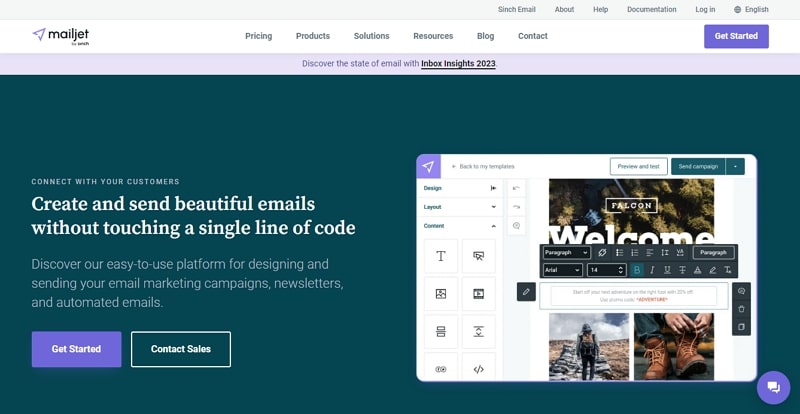
While every business needs an email API service that can handle essential emails and marketing messages, not all companies require the same marketing functions. This is where Mailjet API comes in. It’s designed for businesses seeking more technical email capabilities at a larger scale. Integrating Mailjet is straightforward and lets you schedule, send, and track emails via SMTP relay or their send API.
Mailjet offers ready-to-use libraries for popular programming languages such as PHP, Ruby, Python, C#, Java, Node.js, and more. The Mailjet API documentation provides comprehensive information to help you get started. You are allowed to customize the emails using Golang or Handlebars 3.0. Alternatively, Mailjet’s drag-and-drop email designer will enable you to create dynamic emails with images if you prefer a visual approach.
Pricing Plans
- Free: $0/month (6000 emails/month included)
- Essential: $15/month (15,000 emails/month included)
- Premium: $25/month (15,000 emails/month included)
8. Resend
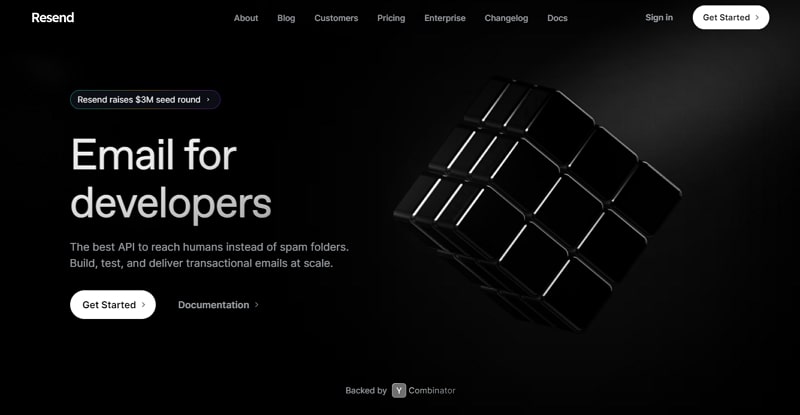
Resend is a relatively new transactional free email API service that belongs to the W23 batch of Y Combinator. The offerings of this API service include outbound email sending, the ability to attach files using base64 encoding, and support for dedicated IP addresses via an add-on. Also, it offers compatibility with DKIM and SPF for security. Additionally, Resend has created a framework called React email.
This is aimed at simplifying the process of building transactional emails using React. It also provides users with a dashboard that enables easy service configuration and access to message statistics, API request logs, and message logs. Furthermore, for those who prefer working with React, Resends JavaScript SDK offers effective integration for sending transactional email templates built with React.
Pricing Plans
- Free: $0/month (3000 emails/month included)
- Pro: $20/month (50,000 emails/month included)
9. Mailchimp
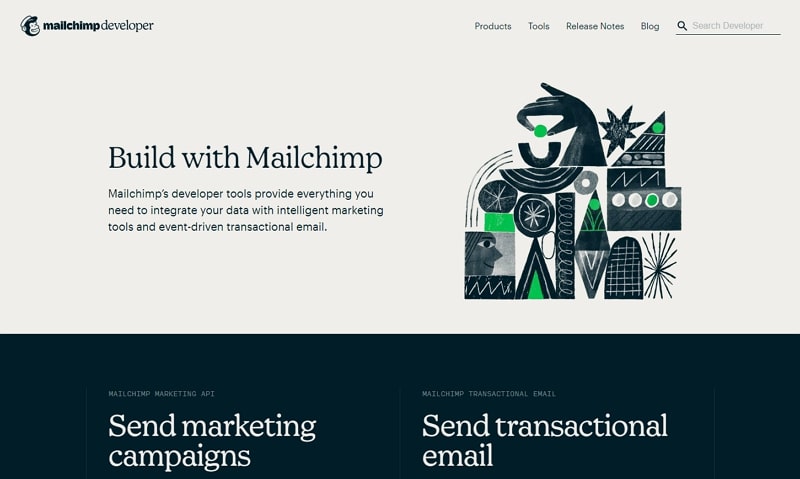
Mailchimp’s transactional service to send email API is an additional tool designed to complement the popular marketing platform, Mailchimp. Formerly known as Mandrill, it has now merged into Mailchimp and requires an active subscription. This service is particularly advantageous for current Mailchimp users. This service offers both outbound (sending) and inbound (receiving) APIs.
It allows you to attach files using user-friendly base 64 encodings. Moreover, it supports essential security measures such as DKIM, DMARC, and SPF. The API service also provides the option for dedicated IP addresses. Notably, there’s an advanced rules engine for applying specific rules to incoming and outgoing emails. Additionally, webhooks enable real-time notifications for email events, aiding prompt responses.
Pricing
- Free: $0/month (1000 emails/month included)
- Essentials: $13/month (5000 emails/month included)
- Standard: $20/month (6000 emails/month included)
- Premium: $350/month (150,000 emails/month included)
10. Nylas
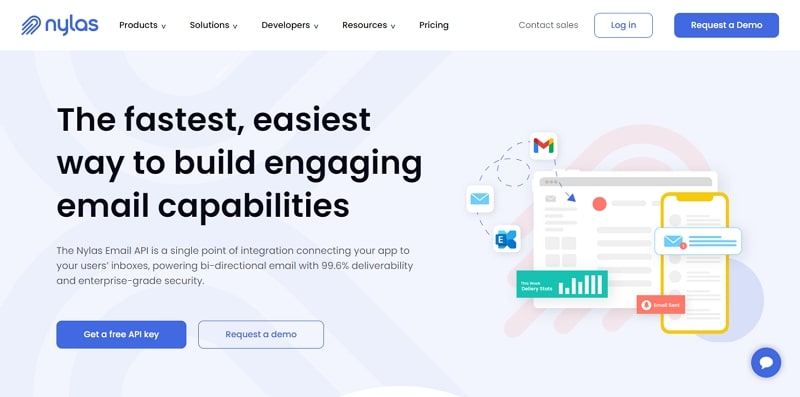
Nylas email API acts as a central integration point, linking your application with users’ email accounts. It facilitates two-way email communication while maintaining enterprise-grade security. Its most remarkable feature is its compatibility with all virtual email service providers without requiring custom code. However, Nylas simplifies integration by enabling connections to almost all email services.
This significantly reduces the workload for developers, allowing them to focus on advancing their projects. Nylas provides a robust email experience, supporting bidirectional synchronization. It also offers create, read, update, and delete (CRUD) capabilities on a highly scalable platform. Notably, Nylas boasts a leading 99.6% deliverability rate, ensuring emails are sent directly from users’ inboxes, bypassing intermediaries.
Pricing Plan
- Contact the Sales Team
Elevate Your Communications with ZEGOCLOUD API
While traditional methods like email are reliable, there exists a more dynamic and productive way to engage with the audience. Utilize ZEGOCLOUD, a transformative solution that takes your communication to the next level. Its video call API and voice call API present a compelling alternative, offering a range of benefits beyond text-based communication while offering up to 10,000 video participants.
With ZEGOCLOUD, you can build immersive video experiences that captivate your users. The video call SDK & API enables you to embed high-quality, real-time video into your applications. This lets you create customized video-calling experiences that cater to your audience’s preferences and needs. Moreover, the voice call SDK offers crystal-clear voice conversations while delivering 300ms ultra-low latency.
To further enhance the development process, ZEGOCLOUD offers UIKits, a collection of low-code, pre-built kits. These UIKits streamline the integration of video and audio functionalities into applications, reducing development time and complexity. By providing readily available components and interfaces, UIKits enable developers to focus on creating unique user experiences without worrying about the underlying technical details. This blend of advanced APIs with easy-to-use UIKits makes ZEGOCLOUD a comprehensive solution for creating next-generation communication tools.
Read more:
Let’s Build APP Together
Start building with real-time video, voice & chat SDK for apps today!









